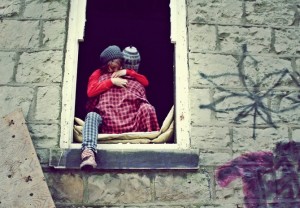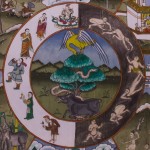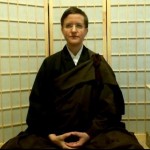 On the one hand everything’s going to hell in a hand basket and we have to respond. On the other hand everything is complete and luminous just as it is. The amazing thing is these aren’t just two different views that one can choose to adopt at different times – these are two aspects of reality that are true simultaneously. Of course, this is much easier said than experienced!
On the one hand everything’s going to hell in a hand basket and we have to respond. On the other hand everything is complete and luminous just as it is. The amazing thing is these aren’t just two different views that one can choose to adopt at different times – these are two aspects of reality that are true simultaneously. Of course, this is much easier said than experienced!
A number of my recent blog posts have dealt with this apparently paradoxical nature of life, which for Buddhists is called the relationship between the absolute (everything is fundamentally okay) and the relative (the world is full of real suffering due to grasping, aversion, and delusion). I’ve sincerely asked questions like this, “I’ve accessed great peace and joy by seeing how all beings and things are fundamentally okay, but how does that benefit beings who don’t realize this?” In other words, beings who do not understand or believe they have Buddha nature, or that they are unconditionally loved by – or part of – God, often suffer terribly as a result and may also cause great difficulty for others. Is the grace of Buddha nature, or belonging to God, contingent on someone’s spiritual insight or heartfelt conversion? Or does their “fundamentally okay” nature manifest in some meaningful way no matter the state of their mind or heart?
Lately, my experience of life has been subtly shifting: The absolute and relative aspects of any given situation have started – to some extent – to occupy the same space and time. This has been happening because I’ve stopped trying to reconcile the two truths. It’s a little like staring at one of those Magic Eye pictures until, finally, an image starts to appear. In order for your brain to register the hidden picture, you have to stop trying to see it. You simply look, and let your eyes and brain work it out. In the case of the absolute and relative, I refused to anticipate an answer – instead, letting one appear if it was going to, and resigning myself to the possibility that it wouldn’t.
Seeing the absolute and the relative at the same time is nearly impossible to describe, so I’ll just give you a real-life example. A woman named Rose came to one our recent meditation meetings in downtown Portland. She saw the sign on the street saying, “Special invitation to anyone experiencing homelessness,” and came on in. She set down her many bags, joined the meditation circle, and seemed to enjoy the evening even if she wasn’t tracking all of what was going on. I think she especially appreciated the warmth, companionship, and snacks. At one point she gave me a big smile and a hug.
At the end of the meeting Rose asked if anyone could help her find her way back to the shelter where she had stayed earlier in the day. She couldn’t remember the name of it or exactly where it was. A nice young man familiar with downtown shelters figured out, after some discussion, where Rose was talking about and offered to walk her there, although it also became clear she didn’t understand the regulations governing whether and when she could stay at the shelter, and for how long. I was relieved that someone was taking care of her, imagining having to simply send her on her way into the night, bags and all.
As I drove home part of my heart stayed with Rose. The sadness of not being able to help her, or address the larger problems that led to her living on the street, threatened to join a growing ball of stress that lurks silently under all of my daily activities. However, I didn’t want to just push her out of my mind for the sake of my own comfort and happiness.
But then I also saw how Rose and the whole situation was just luminous life unfolding. How any concepts like “unfortunate,” “homeless,” or “sad” were artificial limitations on the complex reality of a living situation – convenient labels that prevent me from fully experiencing and responding. How Rose’s life – and all life – is a miracle when viewed without any expectations, and how the future is wide open for Rose and for all of us.
Please note – these weren’t intellectual platitudes I was using to console myself. I could see these absolute aspects of the situation, and – here’s the clincher – the absolute truth did not obscure the relative truth in any way whatsoever. I could still see the difficulty and suffering clearly. In fact, I felt even more able to open up to seeing it because the absolute truth was there too.
The moment I want one side or the other to be more true, I can tell that I’ve started to intellectualize what is a personal, dynamic dance with real life as it unfolds, moment by moment. In the past I’ve resisted the truth of the absolute because I didn’t want anyone to use it as an excuse for inaction. At other times I’ve wanted the absolute to trump the relative so all suffering would be an illusion. Not trying to reconcile the truths or make sense of how they relate to each other seems terribly counter-intuitive and even reckless – but it works.
Even to describe it in words threatens to turn a vital experience into a philosophical approach to life. In the moment with Ruth, there was being with her in her trouble, and there was recognizing the sense in which she was lacking nothing and radiant with dignity.
Hug-O-War (cropped) by ClickFlashPhotos / Nicki Varkevisser, Creative Commons some right reserved












